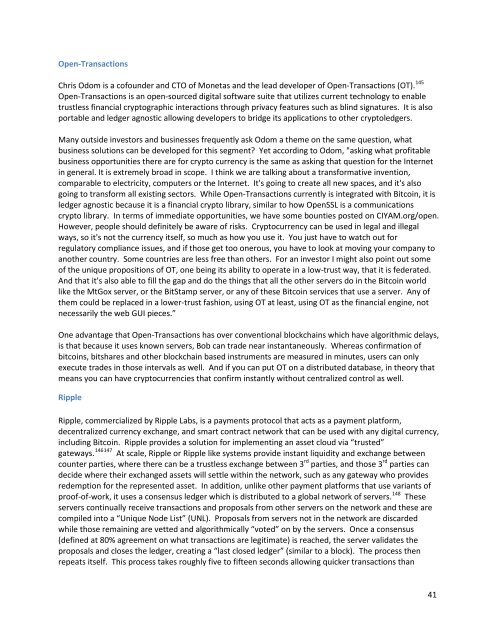Great+Chain+of+Numbers+A+Guide+to+Smart+Contracts,+Smart+Property+and+Trustless+Asset+Management+-+Tim+Swanson
Great+Chain+of+Numbers+A+Guide+to+Smart+Contracts,+Smart+Property+and+Trustless+Asset+Management+-+Tim+Swanson
Great+Chain+of+Numbers+A+Guide+to+Smart+Contracts,+Smart+Property+and+Trustless+Asset+Management+-+Tim+Swanson
You also want an ePaper? Increase the reach of your titles
YUMPU automatically turns print PDFs into web optimized ePapers that Google loves.
Open-Transactions<br />
Chris Odom is a cofounder and CTO of Monetas and the lead developer of Open-Transactions (OT). 145<br />
Open-Transactions is an open-sourced digital software suite that utilizes current technology to enable<br />
trustless financial cryptographic interactions through privacy features such as blind signatures. It is also<br />
portable and ledger agnostic allowing developers to bridge its applications to other cryptoledgers.<br />
Many outside investors and businesses frequently ask Odom a theme on the same question, what<br />
business solutions can be developed for this segment? Yet according to Odom, "asking what profitable<br />
business opportunities there are for crypto currency is the same as asking that question for the Internet<br />
in general. It is extremely broad in scope. I think we are talking about a transformative invention,<br />
comparable to electricity, computers or the Internet. It's going to create all new spaces, and it's also<br />
going to transform all existing sectors. While Open-Transactions currently is integrated with Bitcoin, it is<br />
ledger agnostic because it is a financial crypto library, similar to how OpenSSL is a communications<br />
crypto library. In terms of immediate opportunities, we have some bounties posted on CIYAM.org/open.<br />
However, people should definitely be aware of risks. Cryptocurrency can be used in legal and illegal<br />
ways, so it's not the currency itself, so much as how you use it. You just have to watch out for<br />
regulatory compliance issues, and if those get too onerous, you have to look at moving your company to<br />
another country. Some countries are less free than others. For an investor I might also point out some<br />
of the unique propositions of OT, one being its ability to operate in a low-trust way, that it is federated.<br />
And that it's also able to fill the gap and do the things that all the other servers do in the Bitcoin world<br />
like the MtGox server, or the BitStamp server, or any of these Bitcoin services that use a server. Any of<br />
them could be replaced in a lower-trust fashion, using OT at least, using OT as the financial engine, not<br />
necessarily the web GUI pieces.”<br />
One advantage that Open-Transactions has over conventional blockchains which have algorithmic delays,<br />
is that because it uses known servers, Bob can trade near instantaneously. Whereas confirmation of<br />
bitcoins, bitshares and other blockchain based instruments are measured in minutes, users can only<br />
execute trades in those intervals as well. And if you can put OT on a distributed database, in theory that<br />
means you can have cryptocurrencies that confirm instantly without centralized control as well.<br />
Ripple<br />
Ripple, commercialized by Ripple Labs, is a payments protocol that acts as a payment platform,<br />
decentralized currency exchange, and smart contract network that can be used with any digital currency,<br />
including Bitcoin. Ripple provides a solution for implementing an asset cloud via “trusted”<br />
gateways. 146147 At scale, Ripple or Ripple like systems provide instant liquidity and exchange between<br />
counter parties, where there can be a trustless exchange between 3 rd parties, and those 3 rd parties can<br />
decide where their exchanged assets will settle within the network, such as any gateway who provides<br />
redemption for the represented asset. In addition, unlike other payment platforms that use variants of<br />
proof-of-work, it uses a consensus ledger which is distributed to a global network of servers. 148 These<br />
servers continually receive transactions and proposals from other servers on the network and these are<br />
compiled into a “Unique Node List” (UNL). Proposals from servers not in the network are discarded<br />
while those remaining are vetted and algorithmically “voted” on by the servers. Once a consensus<br />
(defined at 80% agreement on what transactions are legitimate) is reached, the server validates the<br />
proposals and closes the ledger, creating a “last closed ledger” (similar to a block). The process then<br />
repeats itself. This process takes roughly five to fifteen seconds allowing quicker transactions than<br />
41


